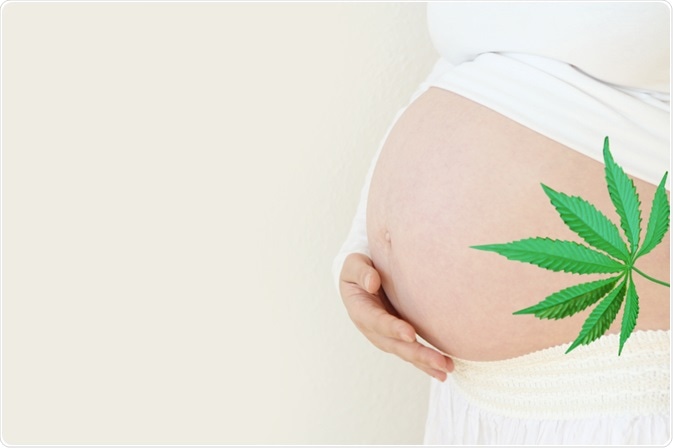The Dangers of Cannabis Use During Pregnancy
An accumulating amount of scientific evidence has found that cannabis use during pregnancy may negatively affect the health of both the pregnant mother as well as the developing fetus. Despite this data, the United States Centers for Disease Control and Prevention (CDC) estimate that nearly 1 in every 20 women in the United States will use cannabis at some point during her pregnancy.
 Image Credit: Kittyfly / Shutterstock.com
Image Credit: Kittyfly / Shutterstock.com
Public misconceptions
Health recommendations provided by national entities like the CDC in the United States generally recommend that pregnant women abstain from cannabis use during their pregnancy. Despite these recommendations, the legalization and general acceptance of cannabis around the world have been found to correlate with an increase in the use of cannabis among pregnant women.
Furthermore, several studies have shown that obstetric health care providers rarely provide counseling to pregnant women who disclose their cannabis use. This leaves patients to turn to social media, friends, and family to receive information on the safety of cannabis use during pregnancy, which is often inaccurate.
Overall, it is estimated in the United States, of women who reported using cannabis at some point during their pregnancy in the past year, 71% believe that there is either a very small or no risk at all associated with cannabis use 1-2 times a week.
Prevalence of cannabis use during pregnancy
In an effort to investigate the overall prevalence of prenatal cannabis use, a recent study conducted by researchers in North California examined the trends in the frequency of cannabis use among women a year prior to getting pregnant, and throughout the course of their pregnancy.
In addition to studying their frequency of cannabis use, this study also assessed any correlations that existed between prenatal cannabis use and the woman’s age group, self-reported race/ethnicity, and/or median neighborhood household income.
This study found that daily, weekly, and monthly cannabis use, both prior to and during pregnancy, experienced a significant increase from 2009 to 2017. More specifically, 25% of the women surveyed reported daily cannabis use prior to getting pregnant, whereas 21% of these women reported daily cannabis use during their pregnancy.
Infant outcomes of prenatal cannabis exposure
Before examining the potential outcomes that can arise when pregnant women use cannabis, it is important first to recognize the fact that cannabis users are more likely to use tobacco, alcohol, and other illicit drugs that are associated with disturbing the development of the fetus. Furthermore, pregnant women using cannabis have also been found to have a less nutritious diet and are less likely to seek antenatal care.
That being said, some of the most consistent data gathered on the infant outcomes of mothers who used cannabis during their pregnancy have shown that regular cannabis smoking during pregnancy can lead to reduced birth weight, developmental abnormalities, and postnatal behavioral effects.
Fetal Development
In 2001, the Generation Rotterdam (Generation R) Study began in the city of Rotterdam in the Netherlands. This study carefully followed pregnant women who used cannabis early on in their pregnancy, as well as mothers who used cannabis throughout the entirety of their pregnancy in order to assess how fetal growth can be affected by prenatal cannabis use.
The data acquired in this study was compared to the fetal growth measurements obtained from pregnant women who smoked tobacco during their pregnancy since tobacco is often used in conjunction with cannabis in the Netherlands. People who did not use either tobacco or cannabis were used for comparison.
To this end, in utero fetal growth retardation was confirmed in 173 women who reported cannabis use early on in their pregnancy. This growth retardation averaged at 156 grams as compared to non-users and tobacco users. Comparably, in utero fetal growth retardation in women who reported continued cannabis use throughout their pregnancy averaged at 277 grams lower than the other groups.
Neurodevelopmental Abnormalities
Various different clinical studies have investigated the behavioral and/or cognitive changes that can occur in children and infants who were exposed to cannabis in utero. Some of the general findings of these studies have found that the children born to women who used cannabis during pregnancy have significant effects on their memory, scholastic skills, reasoning, attention span, impulsivity, and motivation.
The Ottawa Prenatal Prospective Study (OPPS), which was published in both 2002 and 2004, examined both the mental and motor development, as well as expressive and receptive language development of children at 12, 24, 36, and 48 months. Although the data acquired at 12 and 24 months of age were inconclusive, the researchers of this study found that, at 48 months, children exhibited significantly lower memory functioning and certain verbal scores as compared to non-exposed children of the same age.
In an effort to integrate the information that has been published on the neurodevelopmental outcomes of children who have been exposed to cannabis in utero, a group of researchers at Tel Aviv University have hypothesized a condition known as fetal cannabis spectrum disorder.
While the researchers of this study stress the need for scientists around the world to conduct more animal and clinical studies to confirm this hypothesis, the correlation between cannabis exposure in utero and neurodevelopmental changes in children is a pressing issue that must be taken seriously.
Sources
- “Marijuana Use and Pregnancy” – Centers for Disease Control and Prevention
- Young-Wolff, K. C., Sarovar, V., Tucker, L., Conway, A., Alexeeff, S., Weisner, C., et al. (2019). Self-reported Daily, Weekly, and Monthly Cannabis Use Among Women Before and During Pregnancy. JAMA Network Open 2(7). DOI: 10.1001/jamanetworkopen.2019.6471.
- Hall, W., & Degenhardt, L. (2009). Adverse health effects of non-medical cannabis use. The Lancet 374; 1383-1391.
- Huizink, A. C. (2014). Prenatal cannabis exposure and infant outcomes: Overview of studies. Progress in Neuro-Psychopharmacology & Biological Psychiatry 52; 45-52. DOI:10.1016/j.pnpbp.2013.09.014.
- Schreiber, S., & Pick, C. G. (2019). Cannabis use during pregnancy: Are we at the verge of defining a “fetal cannabis spectrum disorder”? Medical Hypotheses 124; 53-55. DOI: 10.1016/j.mehy.2019.02.017.
Further Reading
- All Cannabis Content
- CBD Oil: Health Benefits and Risks
- Cannabis and Psychosis
- Hemp Seed Oil Health Benefits
- Cannabinoid Analysis Techniques
Last Updated: Nov 27, 2019

Written by
Benedette Cuffari
After completing her Bachelor of Science in Toxicology with two minors in Spanish and Chemistry in 2016, Benedette continued her studies to complete her Master of Science in Toxicology in May of 2018.During graduate school, Benedette investigated the dermatotoxicity of mechlorethamine and bendamustine, which are two nitrogen mustard alkylating agents that are currently used in anticancer therapy.
Source: Read Full Article



